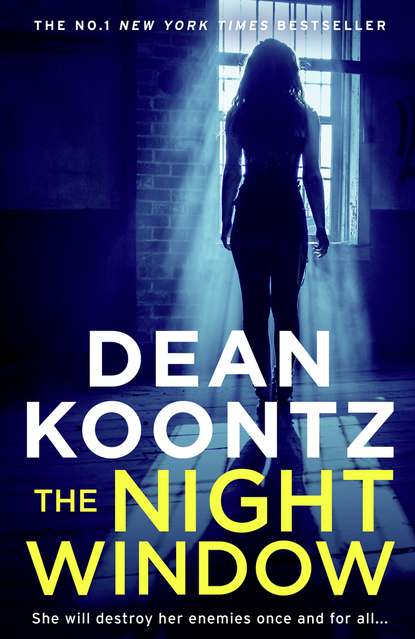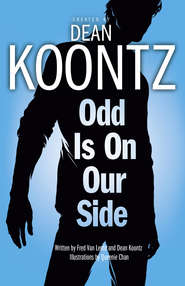По всем вопросам обращайтесь на: info@litportal.ru
(©) 2003-2025.
✖
Jane Hawk Thriller
Автор
Год написания книги
2019
Настройки чтения
Размер шрифта
Высота строк
Поля
“No shit?” she said as she took her foot off the brake.
“I sense you’re perturbed at me.”
“No shit?”
“Why are you perturbed at me?”
“You played me. I don’t like being played.”
“The math said it was necessary.”
“Math isn’t everything. Trust is important.”
“I trust the math.”
“I remembered you as a sweet man. I forgot the annoying part.”
Vikram grinned. “Is that really true?”
“Yes. You can be über-annoying.”
“I meant the ‘sweet man’ part.”
Rather than encourage him, she said, “So you knew what motel I was staying in.”
“Yes. But I expected you to return there in the red Honda, not on the motorcycle. Nevertheless, it worked out.”
“How the jhav did you find me in the first place?”
“Just so you know, I am not one who is turned on by women talking dirty.”
“Don’t make me have to shoot you, Vikram. How did you find me?”
“Now that,” he said, “is quite a story.”
5 (#ulink_c079fd3e-e623-5a0f-92e5-c0160dcf84f3)
Charlie Weatherwax leaves the blind man in the park, crosses the boulevard, and walks through the public spaces around city hall, into a residential neighborhood of tree-lined streets, and from there into the fabled shopping district of Beverly Hills, north of Wilshire. The sidewalks are crowded with moneyed locals bearing shopping bags, also with gaping tourists dazzled by the gleaming shops as well as by the countless Mercedes, Bentleys, and Rolls-Royces. They see one another and interact, but they do not know one another, these islanders of the human archipelago, and they would have it no other way, though if asked they would lay claim to all manner of communal values.
As the sky gradually darkles and the lighted windows of the closing shops radiate glamour and romance into the evening streets, he makes his way to a fine restaurant at which he has a reservation. A choice table awaits him in a corner of the elegant Art Deco bar, the design of which seems to have been inspired by the clean, highly stylized features of his face.
He is not halfway through his martini when he receives an encrypted call on his smartphone. In spite of all its vast resources in both the public and private sectors, the Arcadian revolution has taken two weeks to get a lead on Vikram Rangnekar, but at last they are ready to provide Charlie with an address. His team will be awaiting him at the Peninsula in an hour.
He must be satisfied with a less leisurely dinner than he anticipated, and a single martini instead of two. But the evening will be a lively one, with hard truths taught to the revolution’s enemies.
6 (#ulink_c2630b01-074f-502f-bcb7-6434dfe07b4b)
Riding shotgun without benefit of a shotgun, Vikram Rangnekar thought, I have never been happier. Which was amazing, considering that he had been happy for all his thirty years. According to his mother, Kanta, he had never once been cranky as a baby, and indeed had greeted the obstetrician and delivery-room nurses not with a cry of distress at being expelled from the womb, but with a sound that seemed to be part sigh, part giggle, and with a smile. His father, Aadil, called him chotti batasha, which meant “little sugar candy,” because he was always so good-natured and cheerful. There were those who resented being exposed to his unrelenting sunniness, and a few who even despised him for it; he repaid their hostility with neither anger nor pity, but with indifference, for he was not inclined to let other people annoy him.
Of course bad things had happened to Vikram. No one got a free ride in this troubled world. There were times when he was sad, but those spells were transient and almost always related to the death of someone he loved or admired. For as long as he could remember, he’d understood that happiness was a choice, that there were people who didn’t realize it was theirs to choose or who, for whatever reason, preferred to be perpetually discontented, even angry, even despairing. Most of that type were very political, which Vikram was not. Or they were consumed by envy, which Vikram was not. Or they loved themselves too much, so that they never felt the world was treating them well enough, or they liked themselves too little and wished they were someone else. Vikram liked who he was, although he didn’t think he was God’s gift either to the world or to women.
He’d had his share of romance. He wasn’t a virgin at thirty. There were some women who liked lean and sinewy guys who were gentle and treated them with respect. Of his few paramours, however, none had been fated to be with him forever. One turned out to be waiting to meet a slab of muscle named Curt, who would abuse and disrespect her, and she went off with him. Another, in her second year of graduate school, having learned that men were unnecessary social constructs, vowed to have relations henceforth only with a battery-powered device. The third, an idealistic girl named Larisa, pursuing a career in broadcast journalism, to her dismay concluded that her chosen profession was largely populated by “narcissistic, ill-educated phonies,” and left Washington, where Vikram lived in those days, to return to her hometown—Cedar Rapids, Iowa—where she hoped “to find something real.”
Fortunately, Vikram’s happiness did not depend on the condition of his romantic life.
He thought again, I have never been happier, and of course his current extreme good cheer had everything to do with his driver, Jane Hawk, with whom he’d been infatuated for more than five years. His was largely a platonic infatuation, though not entirely. He was a man, after all, and Jane was too beautiful and too desirable for any straight man to yearn to be only her friend. However, he knew there would never be any romance between them. The sadness of that realization was but a droplet compared to the great warm welling of happiness that he felt just being in her company. When Nick had been alive, no man on Earth could have stolen Jane’s heart, for she had loved him—and he’d loved her—with an intensity that nineteenth-century novelists had described convincingly, but that was seldom found in contemporary arts because such love alluded to a higher love that inspired only contempt in the artists of this era—well, contempt and fear. In death, Nick haunted his lovely widow, not by his spirit’s choice but by her insistent invitation; even if Jane thoroughly avenged her husband’s murder, Vikram suspected that Nick might always be in the doorway of her heart, barring entrance to all other men.
Unrequited love was reward enough for him, which had better be the case, considering that, by coming to this woman’s aid, he put his life at risk and might not survive long enough to earn even a kiss on the cheek.
“How did you find me?” she repeated as she piloted the Explorer Sport through a Pamplona of wheeled bulls all charging southward on Interstate 405 into a sudden inexplicable absence of congestion, the light of the setting sun flickering off brightwork and window glass.
“It’s known that you’ve been driving off-market vehicles with forged plates,” Vikram said. “You had to abandon a black Ford Escape in Texas when the highway patrol pulled you over for some reason, not realizing who you were. You left the trooper handcuffed to your Ford and split in his cruiser. The FBI took your car apart, trying to track its history, but they got epsilon out of it, nothing, nada. I remembered something you told me after you closed the Marcus Paul Headsman case, about this cash-only car dealer in Nogales, Arizona.”
Marcus Paul Headsman had been a serial killer who tried to live up to his surname by collecting the heads of his victims and storing them in a freezer. He said he would have liked to keep their bodies as well, but he would have had to buy several new freezers, for which he lacked the funds.
Headsman had stolen a vehicle from Enrique de Soto, who ran a black-market operation out of a series of barns on a property outside of Nogales. Enrique paid boosters for hijacked cars and trucks. He ferried the hot merchandise directly across the border to Nogales, Mexico, where his people stripped out the GPS and all identifiers. They rebuilt the engine of each vehicle to ensure it would be faster than anything a cop would be driving and returned it to Arizona. Enrique provided forged registration papers and license plates for every customer, which in spite of being bogus had been inserted in Department of Motor Vehicles digital records and would allay the suspicions of any officer of the law. When Headsman was caught, he gave up Enrique, hoping to buy a little leniency.
“I remembered,” said Vikram. “I remember so much of what you told me over the years. Probably all of it. So I backdoored Bureau case files to see what had happened to Enrique de Soto.”
“Nothing happened to him,” Jane said. “We were after Marcus Paul Headsman, and we got him. No time for small fish like Enrique.”
Even when the Bureau was well managed, when it wasn’t being weaponized and used against domestic political enemies, it was nonetheless overwhelmed with cases and needed to practice triage, focusing its manpower on the most egregious crimes that were urgently in need of being addressed. When lesser scofflaws were found wriggling under the rocks that had been overturned in the pursuit of more dangerous and consequential felons, they were either referred to local authorities or added to a collateral-crimes file for later investigation, which is what happened to Enrique de Soto’s case. Later investigation usually translated as the day after never, because there was always bigger game to hunt.
Vikram said, “I remember you wanted to go after de Soto, but if you pushed the issue, your superiors would see you as a quarterback for lost causes. You had to conform to the Bureau Way if you were to have a future in it.”
“And look how well that turned out.”
“So I figured maybe you were getting vehicles from de Soto. I deleted him from the collateral-crimes file, so that no one else in the Bureau would make a connection between him and the Headsman case, and I went down to Nogales to talk with him.”
They were coming toward an exit to a place they didn’t want to go. Jane changed lanes, took the ramp, descended the banked curve at what felt like two Gs, and shot into a neighborhood of industrial buildings that loomed in dark and threatening configurations against the crimson western sky.
She pulled to the curb, put the Explorer in park, switched off the headlights, and turned to Vikram. “Are you freakin’ crazy?”
“What? What’d I do?”
“Ricky de Soto isn’t just some half-assed chop-shop dirtbag. He deals weapons, he’s in human trafficking, he’s a stone-cold killer when he has to be.”
“Well, you deal with him.”
“I don’t have any choice but to deal with him, I know how to deal with him, I can hand him his balls on a plate if I have to, but I still watch my back every damn second I’m near him. But you! You weren’t trained at Quantico. If you carried a gun you’d be no danger to anyone but yourself. When you walk into Ricky’s operation, you’re a bunny rabbit stepping into a wolf’s den.”
“I’m no bunny rabbit,” Vikram protested.
She punched his arm.
“Ow!”
“You’re a sweet, naïve damn bunny rabbit,” she insisted, and she punched him again to emphasize her assertion.











